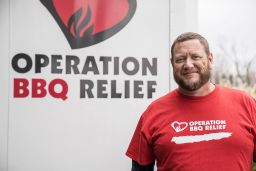Since 2011, Stan Hays has helped bring more than 3 million free barbecue meals to communities hit by natural disasters.
Now, this grand champion pitmaster and his nonprofit, Operation BBQ Relief, have found new ways to help even more people amid the economic devastation of Covid-19.
Normally, the group creates a large, temporary field kitchen staffed with hundreds of volunteers. But Hays realized that to respond to this disaster, his team’s usual way of working wasn’t feasible.
“Our model was based on scale and bringing together a large number of volunteers to push those meals out,” said Hays, a 2017 CNN Hero. “With Covid-19, because of social distancing … that really wasn’t going to be in the cards.”
So, he rented space in his hometown of Kansas City, Missouri, and a handful of volunteers safely produced a few hundred meals a day for veterans and people suffering from homelessness.

But Hays wanted to do more.
“With so many people being laid off, seniors not being able to leave their homes and schools that have closed and stopped serving meals … the need continues to grow,” he said. “It’s like a wave across the country right now.”
Hays also knew that many restaurants had shut down because of the virus, leaving thousands of employees out of work, including many part-time workers who are ineligible for unemployment benefits. Eventually, he realized that one problem might help solve the other.
“We got to thinking about, ‘Well, why not restaurants?’” he said. “We could pay them to reopen and bring back employees to do the meals that we need to do.”
The result was Operation Restaurant Relief, a program that aims to help small businesses stay afloat, keep people employed and provide thousands of free meals for those in need.
The plan is fairly simple. Hays’ nonprofit contracts with restaurants or caterers that have closed or are on the verge of closing. The organization pays the businesses a fee and provides the food for the meals. In return, the business prepares at least 2,500 meals a day for those in need.
“We’re providing all the food to put the meals together there, the necessary supplies that are needed,” said Hays. “And then trying to connect them in their community with organizations that are looking for food.”
In late March, the group launched a pilot program with Plowboys Barbeque. The Kansas City restaurant had been forced to close one of its three locations because of Covid-19, and laid off 40 employees.
“In my 28 years of management, it was the most horrible thing I’ve ever had to do,” Todd Johns, the restaurant’s founder, told CNN affiliate WDAF.
When Hays approached him with his idea, Johns was thrilled. During their partnership, he hired back six employees and put more than 35,000 meals into the community. The effort also proved that Hays’ idea could work.
“To help a small business owner that is struggling bridge the gap, that makes (me) feel … very satisfied,” Hays said. “It’s our own little stimulus package.”
Operation BBQ Relief has now partnered with 12 restaurants around the country. Together, they have provided nearly 850,000 meals to a wide range of people who are food insecure – senior citizens, families impacted by recent layoffs and homeless individuals – as well as hospital staff and first responders.
Hays isn’t the only one who has recognized the advantages of working with the hard-hit restaurant industry to feed the hungry.
In mid-April, acclaimed chef José Andrés and his nonprofit, World Central Kitchen, announced a similar program that pays restaurants $10 for every meal they prepare for vulnerable populations.
For Hays – whose group marks its 9th anniversary today – the recipe is simple.
“It’s providing meals, creating jobs, and helping businesses. It’s a triple win,” he said. “Together, we’re just feeding more people.”
CNN’s Kathleen Toner spoke with Hays about his work. Below is an edited version of their conversation.
CNN: How does the partnership between your organization and a restaurant work?
Stan Hays: OBR is really the center point. We’re providing the logistics – all the food to put the meals together and the necessary supplies that are needed. Our culinary team meets with them to ensure that what we’re providing them with, food-wise, meets the equipment that they have. Not every one of these is a barbecue restaurant, but we’re still providing that hot, comforting meal.
Our logistics teams are also helping them connect with organizations that are looking for food. Many people think that the 2,500 meals a day are going to be the tough part. But it’s not. It’s packaging them and getting them out into the community. If we can make those connections using a virtual team, we keep our people safe and we keep the business going.
CNN: Why are restaurants particularly well-suited to do this work during the pandemic?
Hays: Safety is the utmost concern right now, especially in food service. There’s a lot of heightened protocol right now – changing your gloves every 30 minutes, wiping down the surfaces every 30 minutes with sanitizer, etcetera. Restaurants are used to those kinds of sanitary conditions and they can ensure that they’re doing everything that the CDC has recommended.
We also made sure that they’ve put their own protocols into place – things like separating the front of the house and the back of the house. The kitchen is where the food’s being produced, but the front team is putting it together to go out to the public.
CNN: How challenging has this been for you? You’ve had to develop a completely different way of working.
Hays: I am extremely proud of my team. We took a model that we’ve been working under for almost nine years, spun it on its head and said, “Hey, this is what we need to do to adapt so we can move forward and help during this crisis.” It’s taken a big group of folks working together to make this happen. It really just shows that when you have the heart to want to do something, you find the way to do it.
Want to get involved? Check out the Operation BBQ Relief website and see how to help.






